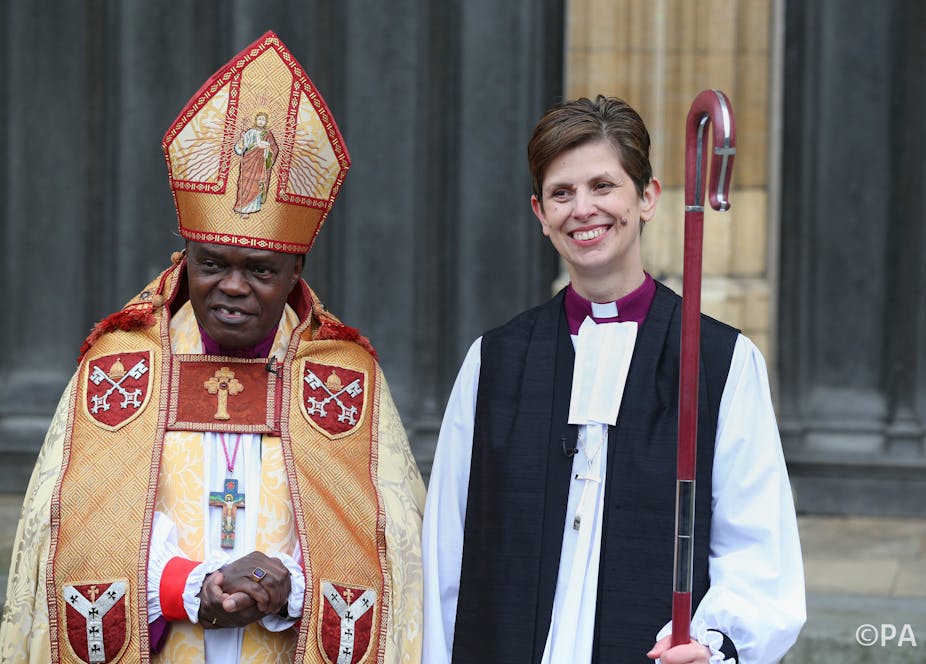“Don’t go all Anglican on me!” quipped Archbishop John Sentamu, as he teased the congregation into a louder affirmation of Libby Lane’s consecration as the Church of England’s first woman bishop on Monday.
Save for the embarrassing intervention of a lone protestor, it truly was a joyous event, and seemed to convey the spirit of a Church growing in confidence. Perhaps it is no coincidence that, with the issue of women bishops finally resolved, the Church of England has lately appeared emboldened to speak out about inequality. But for many people, this is still a difficult message to stomach from the church.
It seems unlikely that Archbishop Sentamu will venture the same joke at the consecration taking place next week. As has been well documented, Sentamu will lead a number of other Bishops in exercising “gracious restraint” during that ceremony. He and several others will not touch traditionalist Philip North to affirm him when he becomes Bishop of Burnley because those hands have ordained women to the priesthood.
It is usual for all bishops and archbishops present at a consecration to lay their hands on the candidate and pray for them. However, to appease the traditionalists and preserve the legitimacy of Philip North’s consecration, those bishops who have ordained women are to keep their hands off him.
This is, so we are to understand from Sentamu, not to imply a theology of “taint” around women priests, although you could be forgiven for thinking that some kind of theological lurgy must still be lingering in the air.
It is certainly remarkable to be instructed on the notion of taint by Sentamu. This February he will reportedly preach alongside Archbishop Stanley Ntagali in Uganda. Ntagali is a vocal supporter of the anti-homosexuality bill that would mean life imprisonment for gay people in Uganda. When this bill was struck down on a technicality last year, he called the decision a disappointment for the church and for religious leaders, urging the Ugandan parliament to push the bill through to protect children and families from Western-imported homosexuality.

Gay Ugandans are being attacked by mobs and living in fear for their lives under a pernicious culture and climate of homophobia encouraged by their church. Unless Sentamu is going to deliver a sermon disowning the hateful ideas of his hosts, he will find that this appearance will assuredly leave him tainted indeed.
Sentamu had to leave Uganda in fear for his own life under the brutal rule of Idi Amin. In response to a recent question on whether he thought Christians are persecuted in the UK, he replied “I know what persecution looks like. What is happening at the moment in England, it ain’t persecution.”
Well, what is happening to gay people in Uganda plainly is persecution, and Archbishop Sentamu is going to stand side-by-side with the persecutors. If ever there was a time for exercising gracious restraint, an invitation to preach alongside Stanley Ntagali should be high on the list for anyone who opposes inequality and persecution.
Singing from the same hymn sheet?
Meanwhile, Justin Welby, the Archbishop of Canterbury, has not been exercising restraint in talking about inequality.
In his homily at Trinity Wall Street during a recent visit to New York, Welby asserted that Jesus “does not permit us to accept a society in which the weak are excluded (whether because of race, wealth, gender, ability, or sexuality).”
Maybe Sentamu didn’t get the memo. And indeed, it is still rather difficult to stomach lessons on the evils of inequality from an an established church that has locked itself out of equalities legislation.
Research carried out by Lancaster University shows that when people see the Church of England as having a negative effect on society, it is precisely because it appears to oppose equality, particularly for women and gay people. In their concessions to “traditionalists” and by continuing to collude with LGBTI persecution around the world, the church still has a huge problem with credibility when it comes to this subject.
Broadcaster Stephen Fry is due to take part in a debate this week at the University of Cambridge. Surprisingly, he will oppose a motion for disestablishing the Church of England. Given his support for LGBTI rights around the world, it will be interesting to see how he will argue in favour of maintaining the Church’s privileges of establishment.
As church historian Professor Diarmaid MacCulloch stated at a recent debate: “If it is perceived by the bulk of the population of this country as taking sides with evil rather than good, then it has forfeited its continuing right to established status.”
Despite the joyful occasion of Libby Lane’s consecration, the “gracious restraint” of the bishops next week, along with Sentamu’s sermon with Ntagali, prolongs the perception that the church still hasn’t decided which side it is on.

